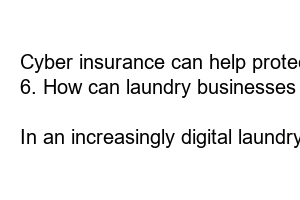세탁업 사이버 위생교육
Title: Ultimate Guide to Laundry Industry Cyber Hygiene Education: Safeguarding Your Business
Introduction:
In today’s digital age, where technology plays a pivotal role in every industry, the laundry industry is no exception. With the increasing adoption of online platforms, cloud storage, and connected devices, it is essential for laundry businesses to prioritize cyber hygiene education. By doing so, they can protect sensitive customer information, secure vital business data, and maintain a strong online presence. Let’s delve into essential cyber hygiene practices for the laundry industry.
1. Understanding Cyber Hygiene in the Laundry Industry:
Proper cyber hygiene entails safeguarding electronic systems, networks, and devices from malicious activities. In the laundry industry, it encompasses securing customer data, financial transactions, inventory management, and laundry process automation. By adopting robust cybersecurity measures, laundry businesses can establish a solid foundation for data protection, minimizing the risk of potential cyber threats.
2. Importance of Employee Training:
*Education is the key to preventing cyber attacks in the laundry industry.* By providing comprehensive training to employees, businesses can bolster their cybersecurity defense. Empower your staff with knowledge about common cyber threats, such as phishing scams or malware attacks, and reinforce the best practices for creating strong passwords, identifying suspicious emails, and reporting incidents promptly.
3. Implementing Secure Payment Systems:
With online payment methods becoming prevalent, it is vital to prioritize secure payment systems in the laundry industry. *Invest in encrypted payment gateways and regularly update your software* to ensure a secure transaction process. Encrypting customer payment information helps protect sensitive data from unauthorized access and reduces the risk of financial fraud.
4. Securing Connected Devices:
As laundry businesses adopt Internet of Things (IoT) devices for automated processes, it becomes crucial to secure these connected devices. Ensure proper *network segmentation and constant monitoring* of IoT devices to mitigate vulnerabilities. Regularly update firmware, change default passwords, and restrict unnecessary access to minimize the risk of device exploitation.
5. Safeguarding Customer Data:
*Protecting customer data is paramount* for laundry businesses to uphold their reputation and maintain customer trust. Implement stringent data protection policies, such as anonymizing customer information, limiting data access to authorized personnel, and regularly backing up data to secure servers or cloud-based storage with strong encryption.
6. Regular Security Audits:
Conducting regular security audits is a proactive approach to identify vulnerabilities and weaknesses in your laundry business’s cybersecurity infrastructure. *Perform network penetration testing, update security measures, and maintain firewall configurations* to stay one step ahead of potential threats. Regular audits ensure prompt detection of any suspicious activities and minimize the impact of cyber attacks.
FAQs:
1. How often should cybersecurity training be conducted for laundry industry employees?
To ensure maximum effectiveness, cybersecurity training should be conducted at least once a year. However, regular refreshers and updates are recommended to keep employees updated with the latest threats and prevention techniques.
2. Are cloud-based laundry management platforms secure?
Cloud-based platforms can provide robust security measures. However, it is crucial to assess each provider’s security protocols, encryption standards, and data backup procedures before choosing a platform.
3. What are the consequences of a data breach in the laundry industry?
A data breach can lead to severe financial repercussions, loss of customer trust, legal implications, and damage to your laundry business’s reputation. It is crucial to prioritize cybersecurity to avoid such detrimental consequences.
4. What are the common signs of a phishing scam?
Phishing scams often involve emails or messages that appear legitimate but aim to trick recipients into sharing sensitive information. Common signs include misspelled URLs, vague salutations, urgent or threatening language, and requests for personal or financial information.
5. Should laundry businesses invest in cyber insurance?
Cyber insurance can help protect your business in the event of a cyber attack or data breach. Consult an insurance professional to understand the coverage options and assess whether it aligns with your business’s risk profile.
6. How can laundry businesses recover from a cyber attack?
In the unfortunate event of a cyber attack, laundry businesses should notify affected customers, report the incident to the appropriate authorities, conduct a thorough investigation, restore secure systems, and implement measures to prevent a recurrence.
Summary:
In an increasingly digital laundry industry, cyber hygiene education is imperative to safeguard your business from potential cyber threats. Prioritizing employee training, implementing secure payment systems, securing connected devices, protecting customer data, conducting regular security audits, and staying updated on the latest cybersecurity practices are critical steps in maintaining a robust cybersecurity posture. With cyber hygiene at the forefront of your business operations, you can fortify your laundry business against cyber attacks and ensure the safety of your customers’ valuable information.

